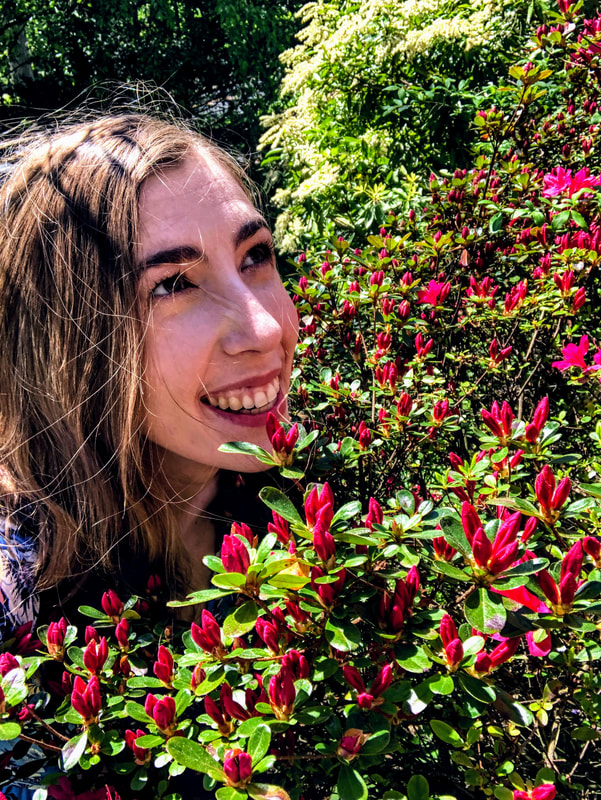Spring Ponderings: Healing My Imagination

Happy Spring!
This Spring I find myself aching for stillness, simplicity and inspiration. After another long winter (though admittedly not nearly as intense here in PA is it was last year) the glowing green trees and vibrant flowers are waking me out of my winter slumber and sparking my thirst for imagination.
I used to feel a constant connection to my imagination. But lately that has not been the case. So I’ve been reflecting on why my mind might feel so dry and lifeless anymore. I realize how much time I spend online, specifically engaging with social media or consuming information, and how little time I allow myself to truly disengage from technology. Between YouTube, Facebook, Instagram, Pinterest, Netflix, blogs, podcasts, emails and even informative books (and part-time work attempts), I believe I reached what is called information overload.
Psychologists define information overload as the state of feeling overwhelmed by the amount of information available to us at any given moment, and not having the tools, skills, or capabilities to keep it organized in a reasonable manner.
For me the consequences of too much information and stimulation include anxiety, confusion, trouble focusing or staying on task, difficulty listening to others, frustration and worst of all stunted imagination. Many studies attest to the real consequences of information overload and its effects on our brain's ability to focus and process information. The New York Times wrote a sobering article about how information overload can even lead us to become addicted to distractions.
Due to my chronic Lyme and overstimulated nervous system, I have to be especially careful with how much stimuli I engage with. It's very easy for small levels of multitasking to set me into overdrive, where I experience anxiety, confusion, shakes and increased pain or fatigue. I have started making some adjustments to how I limit my exposure to social media and consuming information (even self-help or spiritual type of books). I haven't come up with all the answers or a perfect plan yet, but I have started with some small steps.
The trade is worth it
One way I've started combating information overload is spending time away from social media or general web or informational book use altogether for allotted chunks of time. I might call a friend and have a real conversation in my down time. Maybe I'll journal, write a poem, sketch or take some inspiring photos. Maybe I'll brainstorm blog ideas or read a fiction novel that will engage my imagination. Maybe I'll write a card for a friend or paint or just listen to some instrumental music and rest for a little.
The point is that I'm using time that I would otherwise use consuming Youtube, Netflix, Pinterest, etc., and instead allowing the imaginative and creative parts of my brain to percolate and flex their muscles a bit. I'm able to pause and process through the content I have consumed or the conversation's I've had and come to thoughtful conclusions without the noise and screaming of more information bombarding my brain.
And you know what? It's been peaceful. And inspiring.
My deepest motivation for changing my overall attitude and lifestyle regarding information consumption is to re-engage my imagination.
Life is sweeter, richer and more magical (if I may say so) when one allows their mind to think deeply and create freely. It's been a long time since I've been able to healthily engage my imagination. There is so much clutter and noise I absorb every day and I haven't taken time to figure out how to process and release it in a healthy way. Therefore when I try to engage my mind or brainstorm ideas for writing, art, etc. all I hear is buzzing. But I truly believe that cultivating and protecting the mind and imagination from overstimulation is very important to a joyful and healthy inner life.
After all, as a Christian I believe the imagination is one of God's greatest gifts to us. Ecclesiastes 3:11 says, "He (God) has made everything beautiful in its time. He has also set eternity in the human heart; yet no one can fathom what God has done from beginning to end." There it is. I believe, deep down, our hearts are wired to grasp the grandeur of eternity, which explains the presence and importance of the imagination. C.S. Lewis puts it simply:
““If we find ourselves with a desire that nothing in this world can satisfy, the most probably explanation is that we were made for another world.””
I love that quote so much because it gives a logical purpose for the imagination: to point us outside of ourselves to our Creator. Great story writers understand this. They (usually unintentionally) capture the desires of the human heart for eternity and redemption in fantasy worlds, deep friendships, passionate romances and epic quests that end in hard-won happy endings. These imaginative stories have the power to deeply move our hearts and refresh our weary minds. But it takes intentional, uninterrupted time to properly experience the burst of inner energy and refreshment that an epic story might provide.
Beyond personal comfort and enrichment to daily life (or magic, as I like to say), imagination is a powerful agent in personal growth and change. Tim Keller describes this idea perfectly:
““Change happens not just by giving the mind new arguments but also by feeding the imagination new beauties.””
I desire to know and love God more each day. And that includes giving my imagination space to truly worship and be excited at God's glory, amazing love and future redemption. After all, walking by faith and not sight (2 Corinthians 5:7), requires imagination! I can't see God, but when I delight in the beauty of my garden, it reminds me that this is only a dim representation of the creative, intricate mind of God. When I read a story with an heartwarming love plot, it reminds me that if human romantic love can be so glorious and fulfilling, how much more satisfying will our perfect union with Christ be in eternity when sin and suffering are finally gone.
My point is that there are psychological, emotional and spiritual benefits to taking intentional time to pull away from the noise of life and allow the mind to rest, rejuvenate and imagine. Whether it's reading more fiction books, writing short stories of my own, creating more thoughtful art or just enjoying time outside, I want to cultivate and nurture my imaginative side more intentionally this year.






